Below are the full success and client stories from the Hamilton County Elderly Services Program (ESP) 2024 Annual Report. These stories illustrate the impact ESP has on older adults and caregivers in Hamilton County.
Click here to view the program’s 2024 annual report. To request a paper copy, email us.
513Relief Bus and COA receive national innovation award for work to connect residents with resources
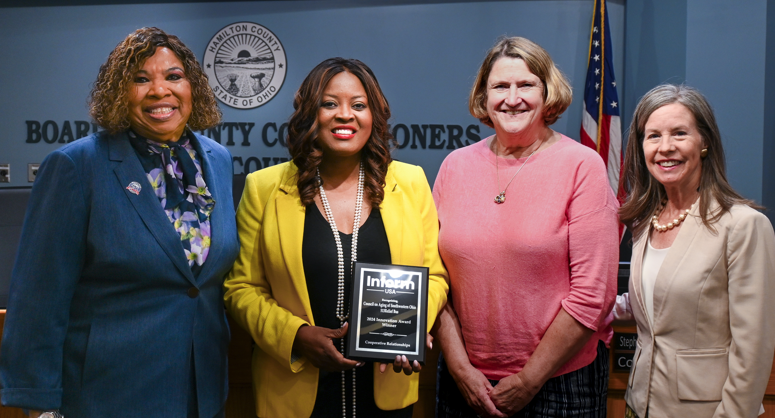
2024 marked the second year of COA’s partnership with Hamilton County’s innovative 513Relief Bus. As Hamilton County’s designated Aging and Disability Resource Center, COA is charged with helping individuals connect with programs, services and resources that support independence and improve quality of life for older adults, individuals with disabilities and caregivers.
This work traditionally occurs via COA’s call center or website, but the county’s 513Relief Bus provides a unique opportunity for COA staff to go out into communities and serve people face-to-face.
“We are reaching people in a completely new way,” said COA’s Director of Community and Business Services Operations, Kim Clark. “We’re getting our name out there and meeting people we wouldn’t meet otherwise.”
In May 2024, COA and the county were recognized by Inform USA with the organization’s 2024 Innovation Award for Cooperative Relationships. Inform USA is a national association for organizations that provide information and referral services, including 211 programs and organizations who work in the areas of aging and disability services. COA is a member of Inform USA.
Council on Aging CEO Suzanne Burke presented the award to county commissioners in September. “This is a tremendous resource Hamilton County commissioners have made available to county residents,” said Burke. “We appreciate the opportunity to have a seat on the 513Relief Bus and to be able to connect with older adults where they live and work.”
In 2024, COA was on board the bus and/or participated in more than 50 513Relief Bus events, including the Healthy Aging Day Party, held in September at Word of Deliverance Church in Forest Park. COA helped to plan the event, which included dozens of other community agencies and partners and featured dancing, yoga, Bingo, barber and beautician services, food and more – all for older adults.
Nationally recognized home52 Transportation helps meet specialized transportation needs of Hamilton County older adults
home52 Transportation was selected for inclusion in the 2023 National Aging and Disability Transportation Center’s (NADTC) Innovations Showcase, a publication highlighting transportation programs selected through a nationwide competition that showcases creative thinking and effective resource utilization in the transportation sector serving older adults, people with disabilities and caregivers within their communities.
home52 Transportation was recognized for its same-day transportation model that enhances specialized transportation accessibility and fosters collaboration among regional providers. home52 Transportation addresses the limitations of regional public transportation systems by providing accessible vehicles, personalized support and frequent communication with riders, drivers and medical facilities.
Through provider coordination, home52 Transportation creates a more efficient and reliable transportation system for older adults and individuals with disabilities by reducing deadhead miles and creating cost savings for providers, funders and riders. home52 Transportation served 1,291 Hamilton County residents in 2024, including Michelle Turnbow.
Turnbow, 70, was a long-time user of public transportation until health complications made it impossible for her to get to the bus stop. She then had to rely on others for her transportation needs.
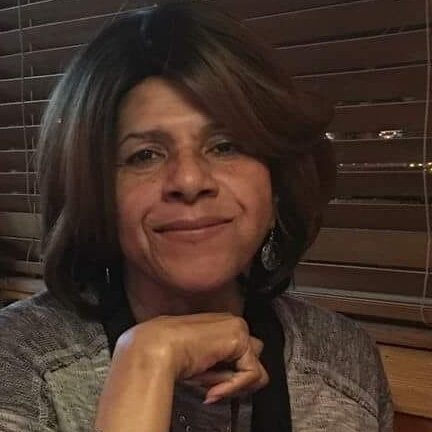
“I was feeling stuck and confined to my home,” Turnbow said. “I had to rely on my family and friends. Many had to take time off work to help transport me to doctor’s appointments. I was feeling isolated, sad and a burden to others.”
Turnbow is not alone. More than 11 million U.S. older adults are non-drivers and 2.3 million have transportation-related barriers that prevent them from participating in social activities, visiting with family and friends, and attending religious services. The 2019 Ohio Medicaid Assessment Survey found that 13.4% of older Ohioans who reported forgoing needed healthcare did so because of transportation-related issues.
“When we talk about older adults and transportation, it’s easy to understand the health impact of not being able to get to a doctor’s appointment or to the pharmacy to pick up prescriptions,” said Council on Aging CEO Suzanne Burke. “It’s the social and mental aspect that is often overlooked. If you think of the many ways we rely on transportation to help us stay connected to our social network, and then take away that transportation, the negative impact of that loss is significant.”
A study in the Journal of the American Geriatric Society noted that 40% of older adults said access to public transportation prevented them from using it. Common transportation access barriers for older adults include:
- Fewer routes in rural and suburban areas
- Cost
- Trouble understanding rideshare technology
- Rides that can’t accommodate mobility needs
- Poorly maintained sidewalks/routes to bus stops
- Weather
- Need for same-day or flexible scheduling
Turnbow connected with home52 Transportation, a specialized transportation service created by Council on Aging subsidiary, home52. home52 Transportation was designed with people like Turnbow in mind: individuals who need specialized or hands-on transportation service and who are not able to use public transportation or rideshare services due to their support needs or access barriers.
home52 Transportation understands the unique needs of older riders and riders with disabilities. home52’s Transportation Coordination Center makes reminder calls to riders on the day of their scheduled trip, giving riders like Turnbow an opportunity to make sure they are ready to go and significantly reducing the time riders have to wait for a ride to arrive. Riders can contact home52 Transportation when they need to schedule a ride – whether it’s a same day trip to the pharmacy or a future doctor’s appointment.
“[The transportation service] gave me my independence again,” Turnbow said. “It was easy to schedule my rides, and if something changed, I could easily cancel.”
Many home52 Transportation providers are small, family- or minority- owned businesses. They provide hands-on, through-the-door assistance for riders, including help with any assistive devices riders may be using (walkers, canes, wheelchairs, etc.). home52 Transportation serves older adults enrolled in Hamilton County’s Elderly Services Program and is also available to county residents age 55 and older, or individuals age 18 with a disability. Limited funding is available to subsidize rides for low-income riders (eligibility required) and a private pay option is also available. For more information, visit www.home52.org/riders.
Healthy Aging grant improves lives for Hamilton County older adults
In 2023, Hamilton County commissioners received a $2.5 million Healthy Aging grant from the Ohio Department of Aging. The grants were intended to support the creation of new programs or bolster existing programs that focus on delivering services and supports that keep at-risk aging Ohioans in their homes and communities for as long as possible.
The grants were one-time allocations funded by ARPA and were required to be spent by Sept. 30, 2024. More than $40 million in Healthy Aging grant funding was awarded across Ohio’s 88 counties.
Counties were required to allocate a portion of the funding to food and housing assistance and internet access and digital literacy services. The remaining funds could be used to provide evidence-based services which aligned with Ohio’s 2023-2026 State Plan on Aging.
As the Area Agency on Aging for Hamilton County and the county’s partner in administering the local senior services tax levy, Council on Aging (COA) worked with the Hamilton County Elderly Services Program Advisory Council to make recommendations to county commissioners on how to use the grant dollars to address some of the most urgent, unmet needs of older adults in Hamilton County.
County Commissioners collaborated with COA to use funds for essential services for older adults in 2024. COA successfully delivered the services supported by the grant, serving more than 3,600 individuals.
COA’s Vice President of Program Operations, Ken Wilson, explained that the Healthy Aging grant funding arrived at a critical time for Hamilton County and other counties across the state. Wilson cited the end of pandemic relief funding, high inflation and a critical shortage of home care workers as negative forces draining local levy funding and creating pent up demand for home and community-based services.
“The Healthy Aging Grants provided an opportunity to take some pressure off local senior services tax levies and the Elderly Services Programs that they fund,” Wilson said. “This funding – although not permanent – helped us meet critical community needs and avoid waiting lists for services.”
Hamilton County received $2.5 million in Healthy Aging Grant funding and served 3,634 eligible individuals. The grant provided home modifications, including grab bars and access ramps, to 1,023 county older adults to help them remain safe and independent in their homes. The grant also:
- Provided food assistance to 2,528 individuals via home-delivered meals program
- Helped 273 individuals match with community-based caregivers to receive in-home care services via the AddnAide app. Individuals assisted had not been able to access services through traditional home care agencies due to the national home care workforce shortage.
- COA Benefit Specialists assisted 283 clients by enrolling and securing services provided by their health plans, including emergency response services and medical transportation.
“These grants helped us serve more vulnerable older adults, without placing additional strain on county senior services tax levies,” Wilson said. “We were able to provide critical services that met the aim of the grant’s purpose – to help older adults live safely and independently in their homes and communities. The grants also strengthened our relationship with local leaders and key service provider partners in each county.”
All Healthy Aging grants funds were spent by the Sept. 30, 2024 deadline.
Innovative service prevents simple need from becoming a big barrier to independence
As we age, it can become harder to do daily tasks on our own. Chronic health conditions or disabilities can hinder our ability to cook a meal, drive a car, take a shower or do our own laundry. However, our inability to do any of these tasks without assistance shouldn’t automatically lead to a loss of independence.
Such was the case for Pamela, 76, of Mt. Washington. A bad fall and a set of dangerous stairs conspired to keep Pamela from doing laundry on her own. An innovative new service from Council on Aging is meeting that need for Pamela – and others like her – while also saving taxpayer money.
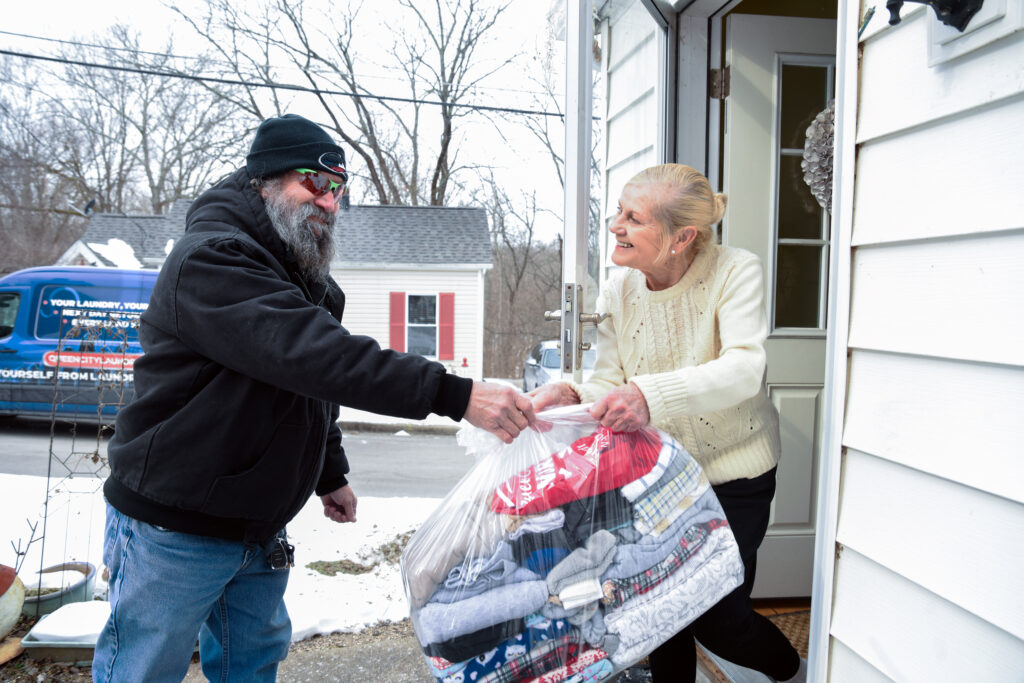
A self-described “old hippie,” Pamela grew up as an army brat. She was born in Lexington, Ky and attended eight schools before attending McNicholas High School as a freshman.
As a young adult, Pamela worked as a model for department stores such as McAlpin’s, Shillito’s and Pogue’s. She also appeared on Bob Braun’s Bandstand on WLWT and spent time touring the country with a boyfriend who was a member of the folk-rock band, Pure Prairie League. In her home, she proudly displays photos from her time living with friends in Vermont and hanging out at Coney Island.
At home in Cincinnati, Pamela worked for 25 years as a server at two iconic Jeff Ruby’s restaurants – The Waterfront and The Precinct. She also channeled her love of cats into the development of an animal rescue program that today is known as Ohio Alley Cat Rescue (OAR).
Fast-forward to the 2020s and Pamela says she often spends days at home alone in her 1869 Mt. Washington home – with her two cats, Alice and Archie. “I had all that fun and look at me now: I’m an old lady in an old house!”
Pamela’s home, and her independence, are important to her. That’s why – after a serious fall that resulted in multiple injuries and surgeries – she was grateful to receive a referral from The Christ Hospital to Council on Aging’s FastTrack Home Program. FastTrack provides temporary support for people like Pamela who need some time to regain their independence after a hospital or nursing home stay.
When Pamela first came home from the hospital, FastTrack Home installed grab bars in her bathroom to offer security and help prevent another fall. She also received home-delivered meals but preferred to go back to cooking her own meals as soon as she was able.
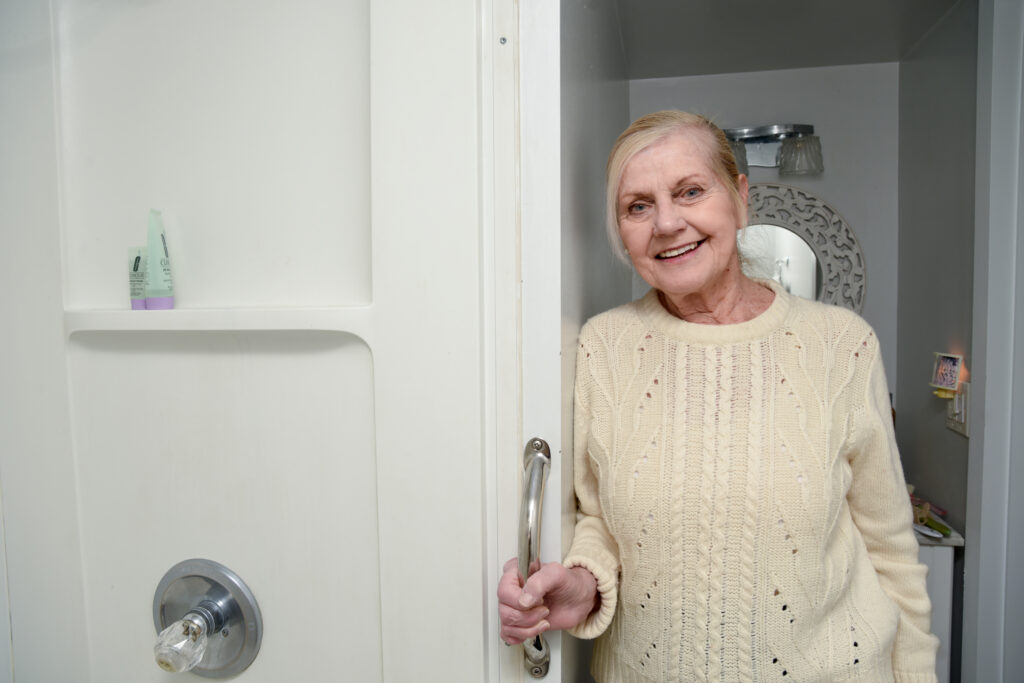
Pamela’s biggest challenge, however was navigating the steep, dark and uneven staircase that led to her basement laundry room. This single issue had become a barrier to independent living and she did not mince words when she shared her determination to stay in the place she has called home for more than 30 years: “I’d just as soon go out of this place feet first.”
ESP’s laundry delivery service means Pamela – who is prone to falls – does not need to navigate the narrow, uneven steps leading to her basement laundry room.
Fortunately, Council on Aging had a solution. In April 2022, COA began offering clients enrolled in FastTrack Home and the Elderly Services Program (ESP) the option to use a laundry delivery service. At the time, COA was dealing with the impact of the national home health aide shortage: 55% of clients in Hamilton, Hamilton and Warren counties were waiting to be matched with an aide for help with household tasks, like laundry.
COA analyzed the waiting lists to identify service needs that could be met in non-traditional ways (without a home health aide). Some clients received adaptive cleaning products so they could safely manage basic household cleaning tasks on their own. Others were offered the opportunity to use the laundry delivery service.
“The laundry delivery service is a win-win for everyone,” said Stephanie Seyfried, vice president in training of managed care and aging services at COA and the architect of the service. “With this service, we are able to fill an important need for many older adults who’d been waiting months for services while also saving money and serving more people. Most importantly, clients are very happy with the service.”
COA has contracts with three laundry providers who manage the pick-up, cleaning, folding and delivery of clients’ weekly laundry. Each client uses the service approximately four times per month. Dirty laundry is collected on a designated day in a receptacle provided by the laundry provider – usually from the client’s porch or stoop – and returned cleaned and folded within 48 hours. Clients can provide input on the type of detergent used.
The laundry delivery service is saving money in FastTrack Home and the Elderly Services Program – both of which are funded by local tax levies – enabling COA to serve more people at a time when demand is high. Enrollment in the service grew 51% over four quarters with 240 clients using the service by Dec. 2024. The service costs $49-$65 per client per month, compared to $204 for the same service provided by a home health aide, resulting in $265,851 in savings to ESP over four quarters.
“Laundry is one of the primary activities of daily living many older adults need help with,” Seyfried said. “Disability, chronic health issues, location of laundry facilities in the home and transportation are all barriers that make it difficult for older adults to manage laundry on their own. It is a seemingly simple service that is having a big impact on older adults’ lives.”
Feedback from clients using the service is positive, with 97% of clients reporting total satisfaction, including Pamela: “This means so much because of the steps [to the basement]. It’s peace of mind. I’m not looking at my dirty laundry and thinking, ‘Oh, no!’”
Competitive bidding yields big savings for Elderly Services Program
As ESP’s administrator, COA contracts with service providers to deliver services to clients. Contracts are awarded through a competitive bidding process. As with all COA services, the goal is to contract with the highest quality providers at the lowest possible price to serve as many clients as possible with the tax dollars available.
In 2024, COA issued a Request for Proposals (RFP) for Electronic Monitoring Systems (EMS). More than the traditional “lifeline” device, EMS is a flexible service that meets a variety of needs, including medication dispensers, smoke and carbon monoxide detectors, Alzheimer’s boundary alarms and GPS tracking devices, among others. It is a popular service within ESP – more than 3,000 enrolled individuals used the service in 2024.
EMS providers offer similar services, often utilize identical hardware and have very scalable cost structures. With that in mind, COA sought a volume discount (across four counties) with a high-quality provider via a five-year contract. Since 2015, the previous single-sourced contract has saved nearly $5 million for senior services levies in Hamilton, Clinton, Hamilton and Warren counties. In the case of the 2024 EMS RFP, COA anticipates the new five-year contract with Guardian Medical Monitoring will save an additional $1.5 million (20% reduction in previous contract costs), which amounts to $768,300 in savings for Hamilton County ESP. The new monthly service rate for the most common EMS option is $19 – a rate that is 42% lower than the Medicaid rate for the same service.
COA-backed rule change benefits home-delivered meals clients; cuts expenses
As the Area Agency on Aging for southwestern Ohio, Council on Aging (COA) advocates on behalf of older adults and the provider network that serves them. In 2024, COA advocated for changes to a rule that reduced costs, eliminated regulatory burden and eased service access for clients.
Due to COA’s persistence, the change came about in 2024 after more than 10 years of work. In 2011, COA, other organizations and service providers began advocating with the Ohio Department of Aging (ODA) to loosen or remove the “diet order” in Ohio’s administrative code for clients receiving therapeutic home-delivered meals. Therapeutic meals follow specific nutritional guidelines for those who require a certain diet for health conditions, or are mechanically altered (chopped, mashed, etc.) for safe chewing and swallowing.
The diet order required a prescription from a physician for a client to receive therapeutic meals. “The requirement imposed a huge burden on home-delivered meal providers and COA’s care management staff,” said Ken Wilson, COA’s vice president of program operations, who was instrumental in advocating for the rule change. Additionally, “other states didn’t have the requirement,” he said.
COA submitted a formal proposal for a change in 2019, but it received no traction. Then, COA Government Relations Director Nan Cahall suggested making the case for a rule change through Ohio’s Common Sense Initiative (CSI), which reviews state agency regulations as potential obstacles to business.
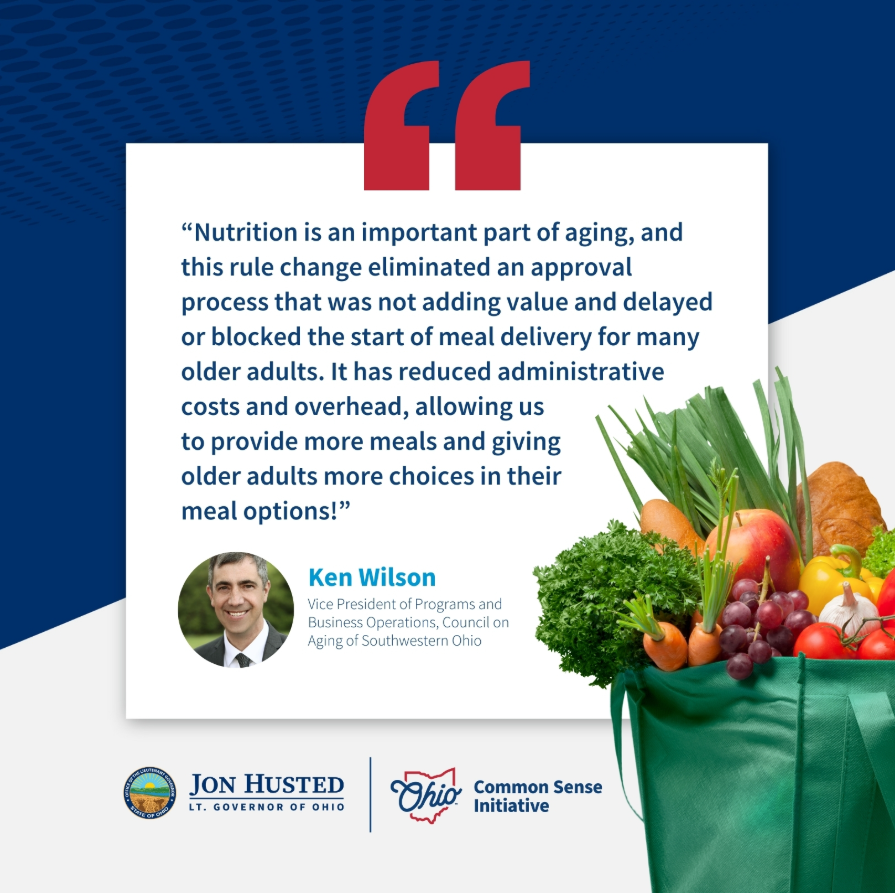
COA partnered with home-delivered meals provider Meals on Wheels of Southwest OH & Northern KY to make its case: that the rule required a tremendous amount of unnecessary time and resources to obtain prescriptions from physicians who were generally not equipped to provide them quickly. And most importantly, it delayed older adults receiving the appropriate meals.
CSI investigated and met with ODA and the Ohio Department of Medicaid to advocate for the rule change. In 2024, the rule was successfully amended to allow flexibility in the prescription requirement.
“The change not only allows more personal choice and autonomy for older adults but is helping us achieve our main goal: to ensure the health and safety of our clients by providing the correct meal without unnecessary delays,” Cahall said.
COA and providers are also saving money as a result of the rule change. “We saw a 7% reduction in home-delivered meal expenses in our Elderly Services Program (ESP) in Hamilton County,” Wilson said. “This is helpful when we’re facing budget challenges. It allows us to serve more older adults.” Additionally, Meals on Wheels was able to eliminate a $40,000/year position that was dedicated to prescription management.
New program helps address unmet needs of Hamilton County older adults

STEPS to Stability program was created by Council on Aging in 2024 to help address common, one-time needs that can impact an older adult’s ability to remain independent in their homes and communities. The services available through this program will vary over time and are meant to address short-term or one-time needs that cannot be addressed by other programs funded by local senior services tax levies, including the Elderly Services Program or FastTrack Home.
In 2024, the STEPS to Stability program provided $1 million in utility assistance and home repairs and safety modifications to income-eligible older adults in Hamilton County. Since 2023, Hamilton County commissioners have allocated this funding from the senior services levy to help meet the emergent needs of older adults that can often become barriers to independent living. In 2024, 1,023 county older adults received assistance through this program, including Brenda and Bonita.
Homeowner receives new windows following house fire
Brenda, 62, was in the kitchen of her College Hill home when she smelled smoke. What she initially thought was a barbeque at a nearby bed and breakfast turned out to be a mulch fire in the flowerbed at the front of her house.
It was a small fire, so she called the fire department and moved her car out of the driveway to safety. In this short amount of time, the entire front of her home became engulfed in flames, trapping her three dogs inside.
The fire department was able to rescue her dogs and put out the fire, but the front of Brenda’s home, including windows and a bedroom, received extensive damage. While her son was able to help her repair the bedroom, the windows remained boarded up for almost a year because Brenda was unable to afford new ones.
Then, in March 2024, Brenda learned about the Hamilton County STEPS to Stability program and contacted Council on Aging for help.
“I didn’t know what I was going to do,” Brenda said. “I did not think I would qualify [for help], I had been told ‘no’ so many times.”
Brenda spoke with Jenny, a care coordination specialist in the STEPS to Stability Program. “Jenny was so sweet and she made me feel so comfortable. For someone to finally help me was incredible.”
Through the program, Council on Aging was able to provide five new windows for Brenda’s home. “I’m just so grateful,” Brenda said.
For Northside resident, setbacks can’t stop the blessings from coming
When you live in an old home, sometimes one problem can quickly lead to another. It’s a slippery slope, as they say. That’s what happened to Bonita when a water leak drove her water bill into the thousands of dollars.
On a fixed income and already enrolled in Hamilton County’s Elderly Services Program (ESP), Bonita reached out to Council on Aging (COA) for help.
Jenny, a care coordination specialist in COA’s STEPS to Stability Program, got to work “lining up the blessings” for Bonita. STEPS to Stability helps meet the immediate needs of low-income older adults who do not qualify for other assistance programs. It addresses common issues including utility assistance, home repairs and safety modifications.
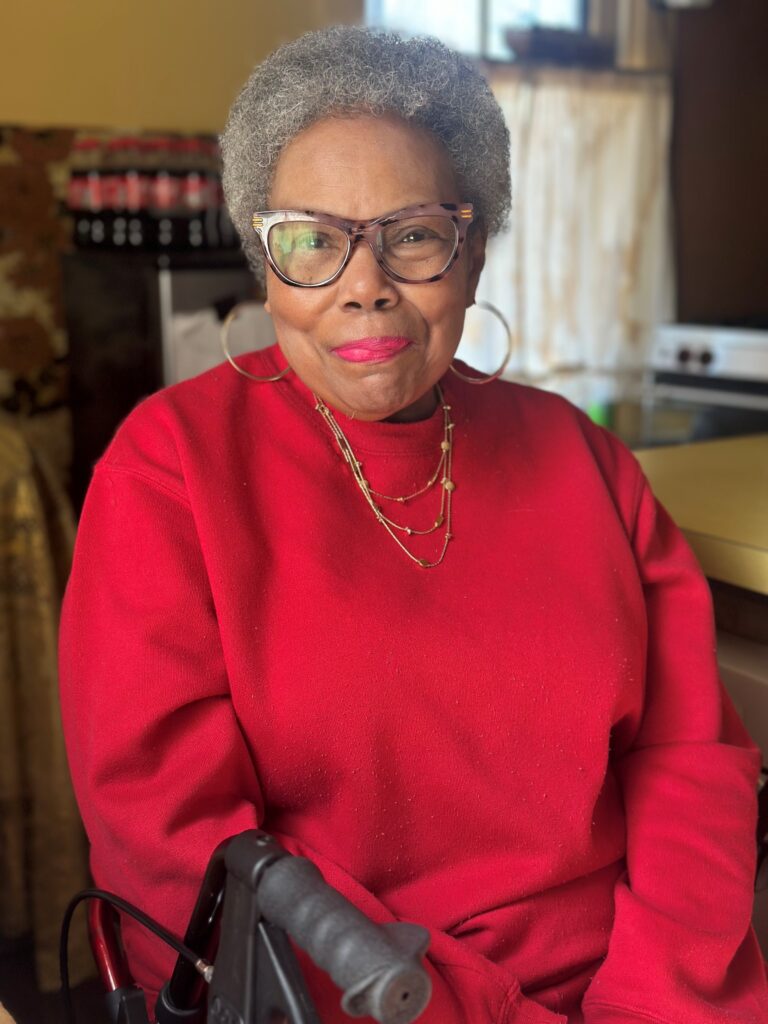
Jenny arranged for a plumber to fix the faucet in Bonita’s Northside home that caused the leak and led to the high water bill. Then she advocated with the water company to have Anita’s bill forgiven. When the bill was reduced to a more manageable level, Jenny applied available utility assistance funding to help wipe out the balance.
In tears, Bonita shared, “Jenny, bless her heart. She kept calling [the water company] because she felt the balance of my bill should be wiped out.”
“I couldn’t thank her enough for the help she did for me,” Bonita continued. “She went over the extra mile trying to get the bill cancelled. I just love her to death for what she did.”
With the water issue resolved after months of struggle, Bonita said Jenny’s work created a ripple effect and the blessings kept coming. One of the providers Jenny connected Bonita with to resolve her plumbing issue was Roto Rooter. A supervisor who visited Bonita’s home noticed that her shower head needed to be replaced. Roto Rooter installed a handheld shower head at no cost to make it easier for Bonita to shower independently.
Jenny also referred Bonita to Little Brothers Friends of the Elderly (LBFE) for help with yard work. Though someone else ultimately took care of the yard work for her, Bonita has benefitted from LBFE’s socialization programs, attending movies and receiving a Valentine’s Day goodie bag.
Through the Elderly Services Program, Bonita, 70, receives a number of services that help her remain independent in the home she grew up in. She knows all her care providers by name and appreciates all they do for her because she herself was once a home health aide, and a caregiver for her mother.
Barbara, Bonita’s home health aide from A Miracle Home Care, helps with difficult housekeeping tasks including mopping, vacuuming and taking out the garbage. “She comes in and does what she’s supposed to do and does it well. She always asks if there is anything else she can do for me,” Bonita said.
Elli from Queen City Laundry picks up and delivers Bonita’s laundry each week – a service she appreciates because she does not have a working washing machine.
For Bonita, though, one of the most important services she receives is transportation. The service allows her to have regular visits with her 88-year-old mother, who now lives in a nursing home.
“I want everyone to know Council on Aging has blessed me and is still blessing me. I really appreciate you all and everything you do for me.”
Council on Aging connects with residents in area low-income senior apartment buildings
In 2024, Council on Aging (COA) staff visited with residents and staff at low-income senior apartment buildings across Hamilton County, sharing information about available programs and services and resources that can have a positive impact on their health and quality of life.
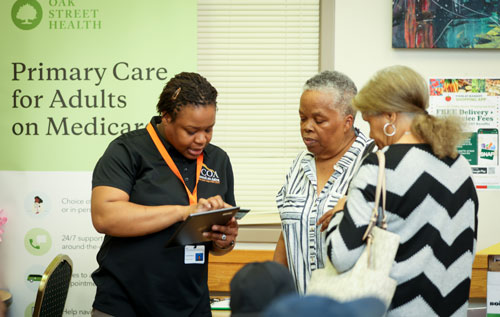
COA Project Manager, Antoinette Moore, visited more than a dozen buildings, connecting with more than 200 low-income older adults.
Moore worked with building managers to provide information and resources in a way that was convenient and accessible for residents. This included giving presentations about Council on Aging programs and services, and connecting residents to COA’s benefits enrollment specialists, who helped residents apply for COA programs or other benefits including help with Medicare prescription costs, utility assistance and nutrition benefits.
“I enjoyed building relationships with staff in these communities,” Moore said. “They know they can reach out to me directly and I can be their connection to COA’s programs and services.”
Feedback from building staff and residents was positive. In an email after one of Moore’s visits, Carla Stokesberry, resident service coordinator for St. Theresa Village in Silverton shared this feedback: “Antoinette, you were amazing! Thank you for serving St. Theresa Village!”
Council on Aging has long served individuals who live in low-income senior apartment buildings through programs such as PASSPORT or the Elderly Services Program, but it was not until the COVID-19 pandemic when COA began to develop close relationships with building staff. During that time, COA provided education and prevention materials, coordinated vaccination clinics, and hosted virtual town halls to help managers stay abreast of current guidance.
“By visiting these apartment buildings, we can bring our programs and services directly to individuals who might need them, while also building lasting relationships with building staff and owners,” said Judy Eschmann, vice president of community and new business operations at COA. “We can meet someone’s immediate needs and also establish a line of communication for future needs.”
COA and library partner to enrich the lives of older adults
By David Siders, Hamilton County Public Library

Age is a gift, and we truly are stronger together.
I find myself sharing these sentiments more and more frequently as I age and reflect on my long career at the Cincinnati & Hamilton County Public Library. I currently work as the Library’s Civic Engagement Coordinator, which allows me to build partnerships with community organizations such as the Council on Aging (COA) which further our reach into our communities, and more deeply connect community members like you to vital resources.
The Library has enjoyed a partnership with COA for several years now. We share similar missions – to connect you to community resources and services that you need most. Working with COA, we have made these connections through events in our libraries such as the Caregiving 3Cs: Compassion, Complex, Critical event for caregivers at which experts shared the ins and outs of what to expect as caregivers and ways to improve the caregiving experience.
In 2024, we held Aging Connections | Hamilton County at our Walnut Hills branch. This event featured a team of county experts to make connections to programs, services, and resources that help older adults and their families thrive.
The Library offers many opportunities for older adults to explore, learn and connect with others. The possibilities are many – you can attend a senior lunch, take a class to learn about scams, or join a book club. Whatever you choose, you are bound to enrich your life through the Library. Find more information about Library events for older adults here.
There is no doubt that collaborating with the Council on Aging means we can make more meaningful connections for older adults, and I look forward to future collaborations with COA to support older adults on their own aging journey.
David Siders has spent his career at the Cincinnati & Hamilton County Public Library. As the Civic Engagement Coordinator, he maximizes the Library’s services based on community needs assessments, with a focus on underserved communities. David builds partnerships with community organizations to reach as many in the community as possible.
